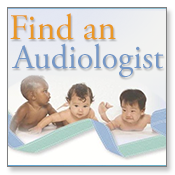Testing a Baby for Hearing Loss

"Looking back now, we know our worry was all in vain. We are so thankful we found out when we did, and were able to get her the help she needed early on." ~ Dorothy
Re-screening
All babies who do not pass the first hearing screening should be re-screened again one to two weeks later, or have a complete hearing test. Your baby’s doctor or the hospital where your baby was born can tell you where to take your child for the hearing re-screen or test.
Regardless, all babies who do not pass the hearing screen or re-screen should have a complete hearing test before 3 months of age.
Testing
A complete hearing test (audiology evaluation) will be done by an expert (audiologist) who is trained to test your baby’s hearing. An audiologist who works with children is sometimes called a pediatric audiologist.
An audiology evaluation is more than just one test. Some of the tests the audiologist might use include:
- A test that will tell the audiologist how your baby’s outer and middle ear are working.
- A test that measures how your baby reacts to sounds.
- A test measures how the ears respond to sound.
- A test that finds out how the ear nerve responds to sound.
The audiologist will also ask you questions about your baby’s birth history, ear infection, hearing loss in your family, and how well you think your baby hears.
The results from all the tests and what you told the audiologists are examined together and the audiologist will make a conclusion. With your permission, the audiologist will share the results with your baby’s doctor and perhaps an ear, nose and throat doctor (called an otolaryngologist). Working together, these professionals can help you understand more about your baby. They might want your baby tested by another expert, such as an eye doctor (ophthalmologist), a doctor who is trained to know about genes (geneticist), or others.
